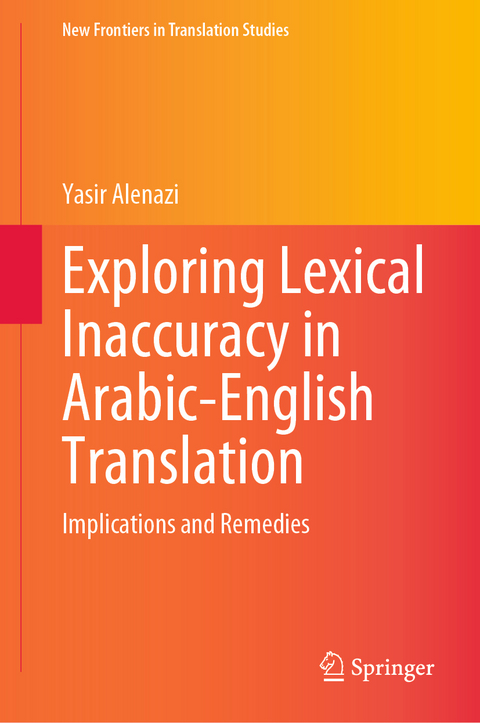
Exploring Lexical Inaccuracy in Arabic-English Translation
Springer Verlag, Singapore
978-981-19-6389-6 (ISBN)
The analyses and findings presented here contribute to the linguistic field by developing a comprehensive list of lexical error categories based on form, content, and origin of influence regarding translation products. In addition, the book sheds light on the pedagogical aspects contributing to the enhancement of ESL/EFL teaching in the Arab context as well as other contexts where English is taught asa foreign language. The book will help educators and curriculum writers in designing materials, and language researchers as a groundwork for their studies of L2 learners’ written products.
Yasir Alenazi has been working in the fields of education/applied linguistics since 2012. He has lived and pursued academic studies in Saudi Arabia, the United States, and Australia. Having completed his Ph.D. in Education/Applied linguistics at the University of Newcastle, Australia, in 2021, he is currently Assistant Professor of TESOL and Applied Linguistics at the Faculty of Arts and Education, the University of Tabuk, Saudi Arabia. His research interests include second language acquisition/learning, error analysis, corpus linguistics, and English for academic purposes. Yasir has held a number of leadership positions including director of preparatory year satellite campuses, dean of admissions and registration coordinator at the University of Tabuk. He served as Deputy Director of its English Language Centre in 2016.
Introduction.- Background.- Statement of the Problem.- Goals of the Study.- Questions of the Study.- Significance of the Study.- Organisation of the book.- Literature Review.- The Significance of Lexis.- The Teaching of Lexis.- Lexical Errors: Approaches to Examine Language Errors.- Sources of Language Errors.- A Brief Overview of Arabic Lexis.- EA Studies on L2 Learners’ Lexical Errors.- Summary of the Identified Gaps in the Literature.- Research Design and Methodology.- Introduction.- Theoretical Framework: Error Analysis.- Conceptual Framework: Lexical Error Taxonomy.- Research Design.- Summary and Conclusion.- Formal Lexical Error Analysis.- Introduction.- Quantitative Analysis and Description of Formal Lexical Errors.- Discussion and Explanation of Formal Lexical Errors.- Conclusion.- Semantic Lexical Error Analysis.- Introduction.- Quantitative Analysis and Description of Semantic Lexical Errors.- Discussion and Explanation of Semantic Lexical Errors.- Conclusion.- Implications for Language Learning, Translation, and Language Teaching.- Introduction.- Implications for Language Learning.- Implications for the Translation Studies.- Implications for Language Teaching.- A Summary of the Analysis Impacts on Language Learning, Translation Studies and Language Teaching.- Conclusion.- Summary, Conclusion, and Recommendations.- Introduction.- Overview of the Research Project.- Summary of the Major Findings.- Contributions of the Study.- Recommendations for Teaching Vocabulary and Alleviating the Related Language Errors.- Limitations of the Study.- Suggestions for Future Research.
| Erscheinungsdatum | 04.11.2022 |
|---|---|
| Reihe/Serie | New Frontiers in Translation Studies |
| Zusatzinfo | 20 Illustrations, color; 3 Illustrations, black and white; XIV, 172 p. 23 illus., 20 illus. in color. |
| Verlagsort | Singapore |
| Sprache | englisch |
| Maße | 155 x 235 mm |
| Themenwelt | Schulbuch / Wörterbuch ► Wörterbuch / Fremdsprachen |
| Geisteswissenschaften ► Sprach- / Literaturwissenschaft ► Sprachwissenschaft | |
| Sozialwissenschaften ► Pädagogik | |
| Schlagworte | English • Error Analysis • Interlanguage • learning • Teaching • Translation • University • vocabulary |
| ISBN-10 | 981-19-6389-4 / 9811963894 |
| ISBN-13 | 978-981-19-6389-6 / 9789811963896 |
| Zustand | Neuware |
| Haben Sie eine Frage zum Produkt? |
aus dem Bereich


